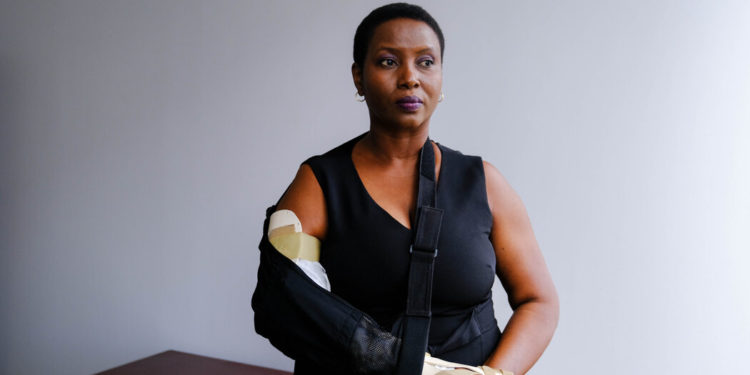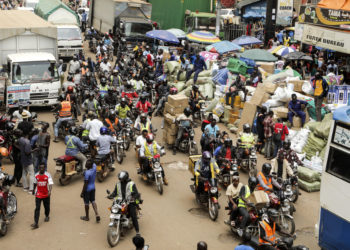By THE NEW YORK TIMES
A Haitian judge has indicted 51 people for their roles in the 2021 assassination of President Jovenel Moïse, including his wife, Martine Moïse, who is accused of being an accomplice, despite being seriously wounded in the attack.
A 122-page copy of the indictment by Judge Walther Voltaire that was provided to The New York Times does not accuse her of planning the killing nor does it offer any direct evidence of her involvement.
Instead, it says that she and other accomplices gave statements that were contradicted by other witnesses, suggesting that they were complicit in the killing. The indictment also cites one of the main defendants in the case in custody in Haiti, who claimed that Mrs. Moïse was plotting with others to take over the presidency.
The accusations echo those contained in a criminal complaint filed by a Haitian prosecutor and submitted to Mr. Voltaire. The official charge against Mrs. Moïse is conspiracy to murder.
A lawyer for Mrs. Moïse, Paul Turner, did not immediately respond to a request for comment.
But Mr. Turner, who is based in South Florida, had earlier denied the accusations in the criminal complaint.
“She was a victim, just like her children that were there, and her husband,” he told The Times. Mr. Turner said his client is in hiding and her current location is unknown to all but a few people.
Mrs. Moïse has long criticized the Haitian investigation, saying officials have shown little interest in unmasking the masterminds of the crime.
Mr. Moïse, 53, was killed in the early hours of July 7, 2021, when a team of Colombian commandos, hired by a Miami-area security company, stormed the president’s home in a wealthy suburb of the Haitian capital, according to the Haitian investigation.
The president and his wife were shot after the gunmen entered the couple’s bedroom and ransacked the home, apparently in search of documents and cash.
In statements immediately after the assassination, Mrs. Moïse said she hid under the couple’s bed to protect herself from the attackers, according to the indictment, which is dated Jan. 25. It was obtained by AyiboPost, an online Haitian news website.
However, the indictment says that the gap between the bed and the floor was 14 to 18 inches, raising questions about her credibility.
In an interview with The Times several weeks after her husband’s killing, Mrs. Moïse recalled being shot in her hand and elbow and hearing their attackers looking for something in Mr. Moïse’s files.
The accusation against Mr. Moïse’s widow is also based on the testimony of a key witness, Joseph Badio, a former official in the Justice Ministry who is accused of being one of the orchestrators of the assassination. Mr. Badio was arrested last October after spending two years in hiding.
According to the indictment, Mr. Badio said Mrs. Moïse was plotting with others, including Claude Joseph, who was the prime minister at the time of the assassination, to get rid of her husband “to monopolize power.”
Despite a two-and-a-half-year investigation, the indictment leaves many questions unanswered. While it goes into some detail about the night of the assassination, it does not explain the motive for the crime nor how it was financed.
A separate U.S. investigation in Miami has resulted in federal charges against 11 men accused of conspiring to kill Mr. Moïse. Six men have pleaded guilty, while the other five are scheduled to go on trial in May. Mrs. Moïse is expected to be a witness.
Some critics have said they believe the indictment in Haiti is tainted by politics, accusing the government of Prime Minister Ariel Henry of using the investigation to attack its critics, including Mrs. Moïse and Mr. Joseph.
“They are using the Haitian justice system to advance their Machiavellian agenda,” Mr. Joseph said.
Mr. Henry’s office said there had been no interference in the investigation.
“The Prime Minister has no direct relationship with the examining magistrate, nor does he control him,” said Jean-Junior Joseph, a spokesman for Mr. Henry. “The judge remains free to issue his order in accordance with the law and his conscience.”
Under Haiti’s legal system, the initial complaint was prepared by a public prosecutor, Edler Guillaume, a political appointee of the current government.
The charges cited by Mr. Voltaire can be appealed within 10 days of the accused receiving a copy of the indictment.
Since the death of Mr. Moïse, gangs have seized control of much of the capital, Port-au-Prince, killing and kidnapping thousands of people. Haiti has no president, nor any other elected national officials, after the terms expired for members of the country’s legislature.
The United Nations has approved a security force led by Kenya to be deployed to Haiti to help quell the violence, but it was blocked last month by a Kenyan court, though the Kenyan government, which is appealing the decision, has said it still plans to send police officers to Haiti.








Discussion about this post